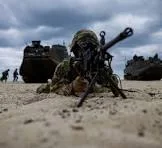In recent years, Japan's military capabilities have been the subject of global interest and scrutiny. As a nation with a rich history, advanced technology, and strategic significance in the Asia-Pacific region, Japan's military prowess holds considerable importance not only for its own defense but also for regional stability. Let's delve into Japan's military capacities, equipment, and its evolving role in the international security landscape.
1. Self-Defense Forces (SDF):
Japan's military, known as the Japan Self-Defense Forces (SDF), operates under strict constitutional constraints imposed after World War II, notably Article 9 of the Japanese Constitution, which renounces the right to wage war. However, Japan maintains a well-equipped and highly trained military force primarily for self-defense purposes. The SDF comprises the Ground Self-Defense Force (GSDF), Maritime Self-Defense Force (MSDF), and Air Self-Defense Force (ASDF).
2. Military Expenditure:
Despite its constitutional limitations, Japan boasts one of the world's largest defense budgets. The country consistently ranks among the top military spenders globally. In recent years, Japan has increased its defense budget to enhance its capabilities in response to regional security challenges, including North Korea's nuclear ambitions and China's assertive actions in the East China Sea and South China Sea.
3. Advanced Technology:
Japan is renowned for its cutting-edge technology, and this extends to its military equipment. The country's defense industry produces sophisticated weaponry and equipment, often in collaboration with international partners. Japan's defense sector focuses on developing advanced fighter jets, naval vessels, missile defense systems, and cyber capabilities to ensure a robust defense posture.
4. Maritime Capabilities:
Given its insular geography and reliance on maritime trade, Japan places significant emphasis on its maritime capabilities. The Maritime Self-Defense Force operates a formidable fleet of destroyers, submarines, patrol vessels, and aircraft carriers (classified as "helicopter destroyers" due to constitutional restrictions). These assets enable Japan to protect its territorial waters, conduct maritime surveillance, and contribute to international peacekeeping operations.
5. Air Superiority:
The Air Self-Defense Force is tasked with safeguarding Japan's airspace and maintaining air superiority. Japan operates advanced fighter aircraft, including F-15J and F-35A fighters, equipped with cutting-edge avionics and weaponry. Additionally, Japan has invested in air defense systems such as Patriot missile batteries to counter potential missile threats.
6. Missile Defense:
In response to North Korea's ballistic missile tests, Japan has developed and deployed a robust missile defense system. This includes land-based Patriot and Aegis Ashore missile defense systems, as well as the sea-based Aegis-equipped destroyers equipped with Standard Missile interceptors. These systems are designed to intercept and destroy incoming missiles, bolstering Japan's defenses against potential threats.
7. Cyber and Space Capabilities:
Recognizing the importance of cyber and space domains in modern warfare, Japan has been enhancing its capabilities in these areas. The country has established cyber defense units to protect against cyberattacks and bolster resilience in the digital sphere. Additionally, Japan is investing in satellite technology for reconnaissance, communication, and navigation, bolstering its strategic capabilities.
8. International Cooperation:
While Japan maintains a primarily defensive posture, it actively participates in international security efforts and defense cooperation with allies. The Japan-U.S. security alliance is the cornerstone of Japan's security policy, providing a framework for mutual defense and cooperation in addressing regional challenges. Japan also engages in defense partnerships and joint exercises with other like-minded countries to promote peace and stability in the Asia-Pacific region.
In conclusion, Japan's military power and capabilities reflect its commitment to self-defense and regional security. Despite constitutional constraints, Japan has developed a highly capable and technologically advanced military force equipped to address contemporary security challenges. As geopolitical dynamics evolve, Japan's role in regional security cooperation and its contributions to international peacekeeping efforts are likely to remain vital components of its defense strategy.




